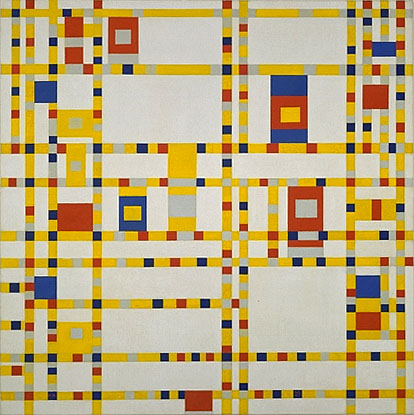 But hey...if Mondrian can feel this way and produce...so can i...i think...
But hey...if Mondrian can feel this way and produce...so can i...i think...4 april 2000
 But hey...if Mondrian can feel this way and produce...so can i...i think...
But hey...if Mondrian can feel this way and produce...so can i...i think...
All people are more or less envious; politicians, envious absolutely. A man becomes one of these only to the degree that he endures no one beside or above himself. To venture upon and undertaking of any kind, even the most insignificant, is to sacrifice to envy, supreme prerogative of the living, law and resource of actions. When envy leaves you, you are no more than an insect, a nothing, a shadow. And a sick man. And if envy should sustain you, it assuages the failures of pride, ministers to your interests, conquers apathy, and performs more than one miracle. Is it not strange that no therapuetics, no ethics have recommended its benefits, whereas, more charitable than providence, envy precedes our steps in order to direct them? To be saved, he must be forced to model himself upon tyrants, to take advantage of their excesses and their misdeeds.
| Mondrian enjoys these colors. I like them too. What do you think? Sometimes i think that i can feel this way. | Have you seen me? have you seen what i have become? have you noticed the rain outside? have you noticed the way you feel that i feel too? i mean think about it...i try to be what they say i cannot be--i cannot be with them |
|
In order to experience this face to face of things with one another in this way, we must, of course, first rid ourselves of the calculative mind. The step back into the sphere of human being demands other things than does the progress into the machine world. To turn back to where we are already staying: that is how we must walk along the way of thinking which now becomes necessary. We speak of language, but constantly seem to be speaking merely about language, while in fact we are already letting language, from within language, speak to us, in language, of itself, saying its nature. |
| First of all, universal history is the history of contingecies,
and not the history of necessity. Ruptures and limits, and not continuity. For great accidents were necessary and amazing encounters that could have happened elsewhere , or before, or might have never happened, in order for the flows to escape coding and , escaping, to nontheless fashion a new machine bearing the determinations of the capitalist society. Thus the encounter between private property and commodity production, which presents itself however, as two quite distict forms of decoding, by privatization and by abstraction. Or, from the viewpoint of private property itself, the encounter between flows of convertible wealth owned by capitalists and a flow of workers possessing nothing more than their labor capacity (here again and repeatedly, two different forms of deterritorialization). In a sense, capitalism has haunted all forms of society, but it haunts them as their terrifying ngihtmare, it is the dread they feel of a flow that would elude their codes. Then again, if we say that capitalism determines the conditions and the posibility of a universal history, this is true only insofar as capitalism has to deal essentially with its own limit, its own destruction-- as Marx says, insofar as it is capable of self-criticism. IN a word, universal history is not only retrospective, it is also contingent, singular, ironic, and critical. |